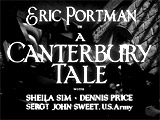
|
A Canterbury Tale (1944, UK)
In Michael Powell's and Emeric Pressburger's drama,
an eccentric and lyrical UK film set not in the 14th century, but
in wartime Britain in 1943:
- the opening voice-over quote from the prologue of
Geoffrey Chaucer's original manuscript: "When that April with
his showers sweet, the drought of March hath pierced to the root
and bathed every vein in such liqueur from which virtue engendered
is the flower. When Zephyrus seek with his swete breath inspired
hath in every holt and heath the tender croppes, and the young
sun hath in the Ram his half cours y-ronne. And smale foweles maken
melody that slepen all the night with open eye - so priketh them
nature in their corages - then longen folk to go on pilgrimages
and palmers for to seken stranger strands to distant shrines known
in sundry lands. And especially from every shire's end of England
to Canterbury they wend, the holy blissful martyr for to seek that
them hath helpen when that they were weak"
|
Transitional Opening - 600 Year Jump-Cut
|
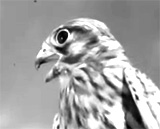
|
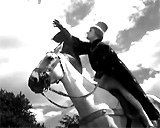
|
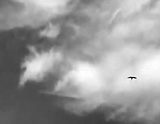
|
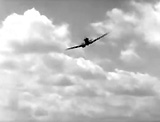
|
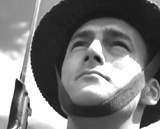
|
|
- the astonishing match-cut camera shot (an influence
or inspiration for Stanley Kubrick's similar match-cut in 2001:
A Space Odyssey (1968) ?) when an ape tossed a bone into
the air and it became an orbiting spacecraft) - in this instance,
a nobleman-falconer (James Sadler) removed the hood from a prized
bird, and released it into the wide-open sky; it immediately soared
into the air - and the time frame shifted 600 years into the future,
with the bird transformed into a RAF Spitfire plane, and the falconer
now a British soldier in WWII wearing a tin hat - (the narrator
spoke in voice-over: "600 years have passed. What would they
see, Dan Chaucer and his goodly company today? The hills and valleys
are the same. Gone are the forests since the enclosures came. Hedgerows
have sprung. The land is under plow and orchards bloom with blossom
on the bough. Sussex and Kent are like a garden fair but sheep
still graze upon the ridges there. The Pilgrims' Way still winds
above the weald through wood and break and many a fertile field.
But though so little's changed since Chaucer's day, another kind
of pilgrim walks the way")
- this was a contemporary tale of three pilgrims on
a modern-day pilgrimage, enroute to Canterbury; they arrived on a
train (during a blackout) in the small Kent town of Chillingbourne
in S. England:
(1) Alison Smith (Sheila Sim) a London department store salesgirl about
to become a "Land Girl" in the Women's Land Army
(2) US Army Sgt. Bob Johnson (John Sweet), a GI serviceman on leave
(3) Peter Gibbs (Dennis Price), a drafted Englishman and cynical former
cinema-organist who gave up his music school dreams
- the scene of a strange nocturnal "Glue Man" who
poured sticky glue into Alison's hair - she was his 11th victim;
as they investigated the incident, they became suspicious of the
eccentric local magistrate, Thomas Colpeper JP (Eric Portman), who
was a farmer whom Alison was to begin working with
- the scene of Colpeper's confession that he was the
Glue Man - with good intentions - to assure that local girls wouldn't
go out at night with GIs and forsake their husbands and boyfriends,
and to hopefully guarantee that they would learn about the area's
history, subsequently, the group made a study of the history of the
area and tales of The Pilgrim's Way
- the scene of Colpeper's lantern-slide lecture, when
he told the audience, in a mesmerizing monologue, that they must
take their own pilgrimage to learn about their past: "Let me
remind you that as much as 600 years ago, doctors and lawyers and
clerks and merchants were passing through here on the old road which
we call the Pilgrims' Way...These ancient pilgrims came to Canterbury
to ask for a blessing or to do penance. You, I hope, are on your
way to secure blessings for the future.... Well, there are more ways
than one of getting close to your ancestors. Follow the old road,
and as you walk, think of them and of the old England. They climbed
Chillingbourne Hill, just as you. They sweated and paused for breath
just as you did today. And when you see the bluebells in the spring
and the wild thyme, and the broom and the heather, you're only seeing
what their eyes saw. You ford the same rivers. The same birds are
singing. When you lie flat on your back and rest, and watch the clouds
sailing, as I often do, you're so close to those other people, that
you can hear the thrumming of the hoofs of their horses, and the
sound of the wheels on the road, and their laughter and talk, and
the music of the instruments they carried. And when I turn the bend
in the road, where they too saw the towers of Canterbury, I feel
I've only to turn my head, to see them on the road behind me"
- by the film's conclusion, once the three pilgrims
had reached Canterbury (in a modern-day pilgrimage) about a ten minute
journey away by train, each of them miraculously received a blessing
in Canterbury and were changed forever:
- both Alison and Bob, who feared that their missing fiancee/girlfriend
was dead, located their loved ones
- and Peter Gibbs played a Bach piece on the organ in Canterbury's
mystical cathedral, during a processional
- in the final shot looking through the flower design
of the cathedral's tower, the bells pealed after the assembled parishioners
in the Canterbury Cathedral sang the old hymn, "Onward Christian
Soldiers"
|

Prologue
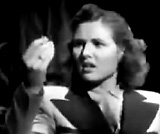
Alison Reporting a Glue Attack in her Hair
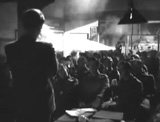
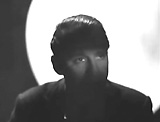
Colpeper's Lantern-Slide Lecture
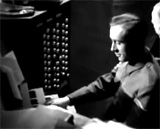
Gibbs Playing the Organ in Canterbury Cathedral
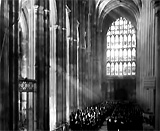
The Grandeur of the Cathedral
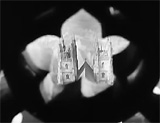
Looking Out of the Cathedral's High Bell Tower
|








